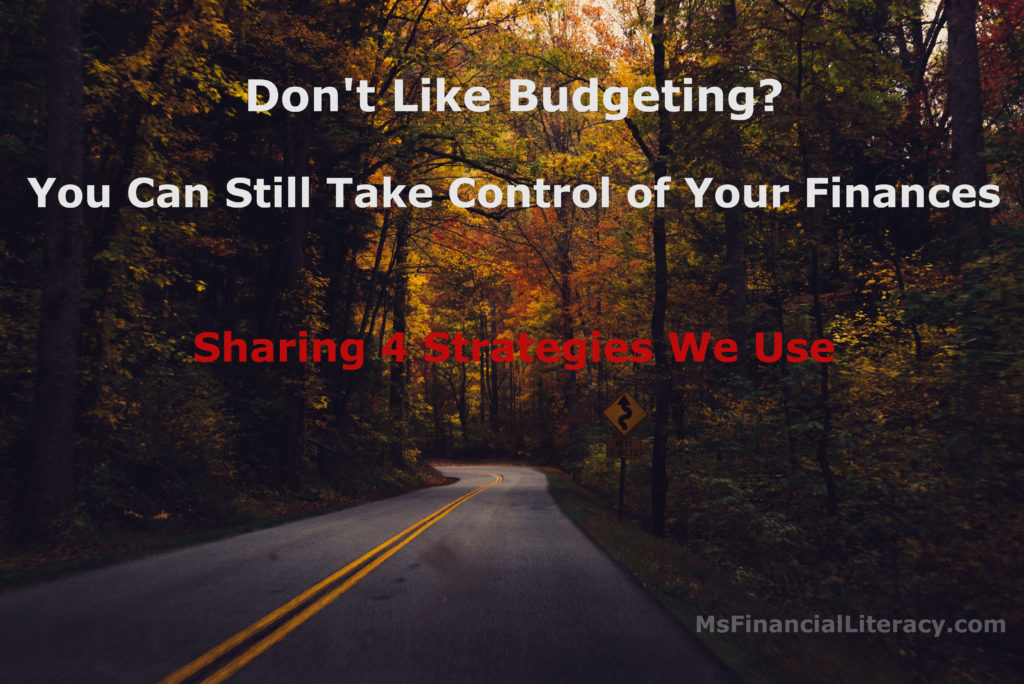Budgeting is just one way of managing your money. My husband and I don’t do budgeting. In this post I shared other strategies and tools we use.
What comes to mind when you think of budgeting? If you think it’s tedious, stressful, or restrictive, then you’re not alone!

Many people claim budgeting is good for your financial health. Much has been written on this topic, from why you need a budget to creating a budget to managing a budget. For a short while, I truly believed having a budget was the way to become wealthy. But my husband and I passed on it after we had a long discussion on the topic. That was in year 2010.
Six years later, my husband and I decided to give budgeting a try. Many personal finance bloggers were doing this. They must knew something, right? We wanted to see what expenses we could cut. The lower our expenses are, the earlier we can retire. We tried for three months. Our consensus? The process was painful, tedious and mentally difficult. It was not about the math. The formulas were simple and the spreadsheet took care of the calculations. It was not about our different views on money. We generally agree on how to manage our household finances. It was not a lack of patience. My husband tracks our portfolio performance almost on a daily basis, and this involves lots of number tracking and focus. So what did it come down to? We lacked commitment. We didn’t see the benefits.
Were we doomed?
On the contrary, we continue seeing our net worth growing steadily. So, for those of you who also balk at the idea of budgeting or have already given up on it once and for all, there’s still hope. As we looked back at our married years together, my husband and I asked each other what was it that we did (or didn’t do) that have helped us successfully manage our finances thus far. It turned out there were several strategies to the equation: (1) treating our net income as 100% potential savings, (2) widening the gap between net income and expense, (3) living a minimalistic lifestyle and (4) investing diligently to grow our savings.
1) Treat Income as 100% Potential Savings
This was something I learned from many parents while growing up. Save as much as you can. Why do you need someone to tell you what your savings rate should be? Wouldn’t your financial life be so much easier if you only focus on maximizing your savings? Once you begin to think like this, you will question your desire to spend. If I can have it my way, I would save 100% of my income. When I was a student and I didn’t have much money, I still enjoyed watching my savings account grow. The act of saving makes me happy. I carried that same mindset into my adulthood. As for my husband, he doesn’t like to spend.
2) Widen the Gap Between Net Income and Expenses
The wider the gap between your net income and expenses, the more money you save. If you can’t picture the equation, draw it out and study it. Expenses cut into your savings. You can also lower your expenses by increasing tax efficiency. Yes, income taxes are expenses! Look at your pay statement. What percentage of your net pay goes to paying taxes? Taxes trim your paycheck. Learn about tax planning strategies and see how you can legally pay less income taxes. My husband went through each line on our recent W2 tax return. He researched what he didn’t know. Let’s just say he spent many hours on the IRS website!
3) Cultivate a Minimalist Mindset
Do your spending habits align with your values? What kind of life you want? Being a minimalist is not just about having less stuff or pinching pennies or depriving yourself. It’s about being intentionally choosing what comes into your life. Buy what you need. Save the rest.
4) Invest Diligently
When you have a savings buffer, look for ways to grow your nest egg diligently (read more here). How to go about doing this? Learn about the different types of investments and their relative risks. What are their expected long-term rates of return? Study the historical averages of various types of investments. Learn and recognize historical patterns and cycles in the stock and housing markets. Once you understand all that, look for opportunities to buy more when prices are cheap.
Concluding Remarks
If the word budgeting excites you or raises your interest, give it a try. If the word scares you, still give it a try. You can decide for yourself after you’ve gone through the process. Budgeting can be a great tool for many including those who get overwhelmed by numbers (or love numbers). If you’re living paycheck-to-paycheck or don’t know where you’re spending your money, then budgeting is a must try. Budgeting can also be useful for those who have complicated finances (e.g., having to track three student loans, a car loan and having multiple streams of income). On the other hand, budgeting may be a little redundant if you already practice the four strategies I mentioned above. In our case, we don’t enjoy doing the extra work. We know ourselves and our financial situation very well.
You have many avenues to manage your personal finance. Let that be technology or certain money mantras or philosophy. Get to know yourself, learn new knowledge and try products and services (either free or at very low cost to you). Over time, you will learn what works best for your unique situation. Learning to manage your finances and mastering it should be empowering. It doesn’t matter if your current net worth is negative, $0 or $10 million. Once you are committed to building wealth and you have the right tools/strategies (and right people) to help you, your net worth will move forward. So, don’t be bogged down by what you must use. First and foremost, you need to decide what kind of financial life you want. Then, incorporate the first three strategies mentioned in this article into your day-to-day financial transactions. When you are ready, consider if strategy #4 is for you.
What are your thoughts on budgeting?
How are you managing your day-to-day financial transactions?
Like what you read? Don’t miss a post. Subscribe to my free newsletter to receive new post updates.
